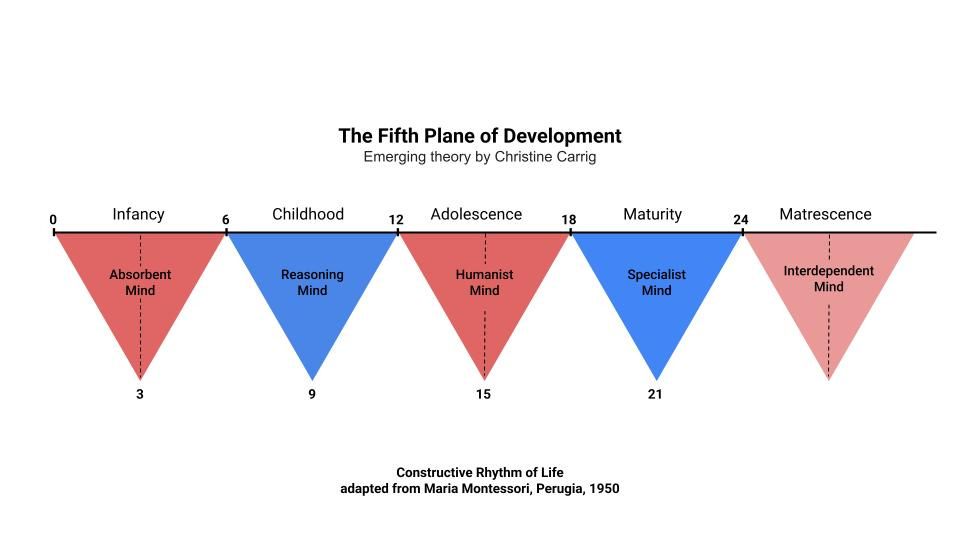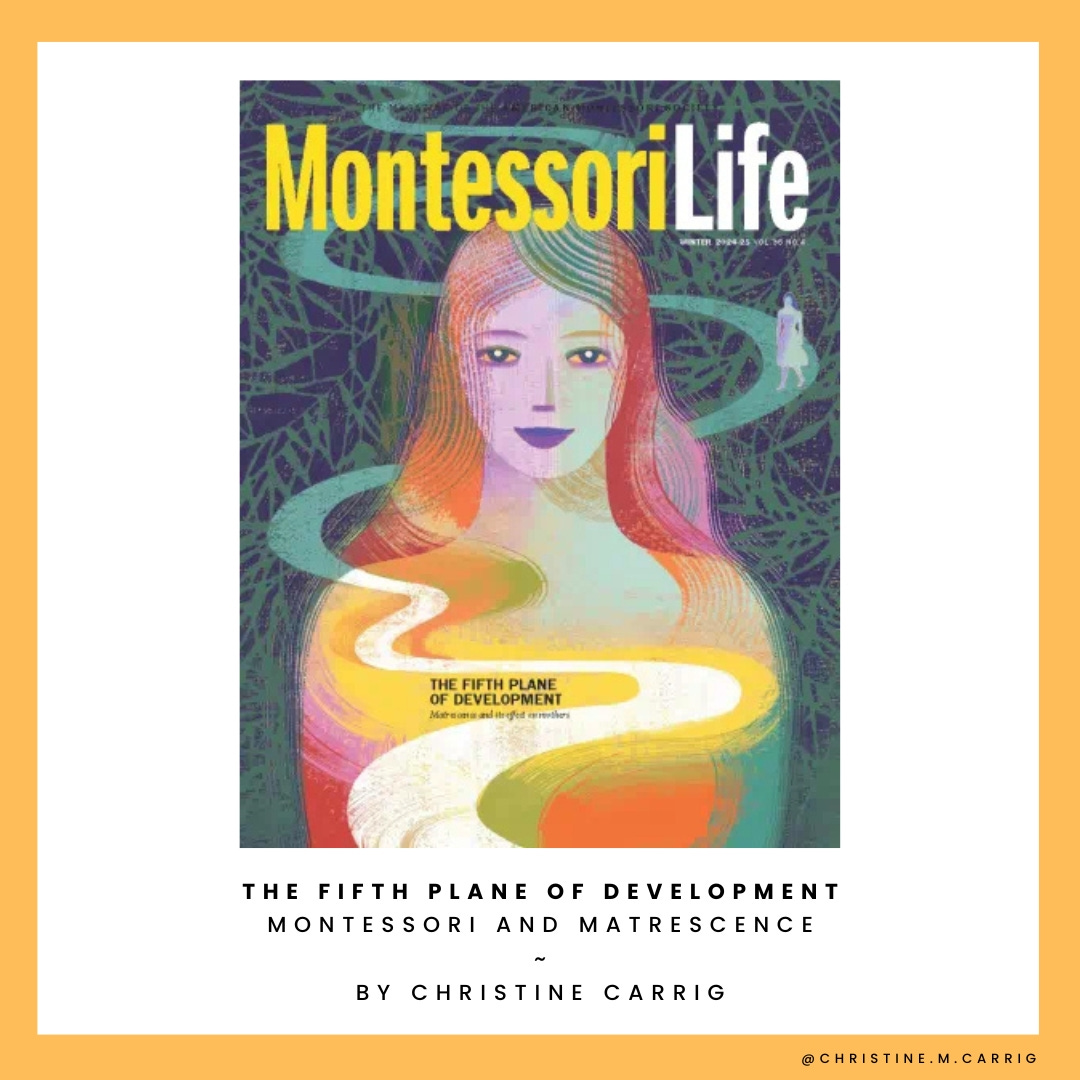Settle in, this one’s a little longer than usual…
After finishing undergrad I immediately moved to NYC to begin two years of Montessori teacher training. This means that for years before I had my own children I subscribed, wholeheartedly and without reservation, to an educational methodology which centered the child so completely that the parent or teacher in the child’s life was often viewed as either a hindrance or a lesser being who could only hope to not tarnish the perfection of the child. No pressure!
In case you think I’m being dramatic with my representation of Montessori’s teachings, here are some quotes from her literature, all of which are describing the adult in relation to the child, and the impossibly high stakes the adult faces in not screwing everything up:
"It is often we who obstruct the child, and so become responsible for anomalies that last a lifetime.... Hence the period under six is decisive. Whatever abilities the child constructs then will remain incarnate in him for life." (Montessori, The Absorbent Mind)
“In a word, [the parent] becomes an obstacle in the way of the child’s developing according to his own natural laws.” (Montessori, The Absorbent Mind)
“The adult must find within himself the still unknown error that prevents him from seeing the child as he is.” (Montessori, The Secret of Childhood)
“The adult suffocates the child’s natural impulse to act…impedes the child’s ability to live, to do anything useful, to exert great energy.” (Montessori, The Child in the Family)
“Certainly any adult would not behave differently toward an enemy who, penetrating the sanctuaries and daring to lay down laws, came to crush the will of the conquered and unarmed. (Montessori, The Child in the Family)
Montessori continually refers to the child as “more innocent and pure” than the adult in their life. And as a teacher I could get behind this because after all, there was an end of the day for me. I still had room for my full subjectivity, my imperfections, my “unknown errors” to surface in the evenings, on weekends, on those long, lovely breaks teachers are availed to.
But it should come as no surprise that when I first laid eyes on my own baby, with all her innocent, slippery, pure perfection, I was pained by the belief that I was destined to tarnish her with all my brittle imperfection, my errors, known and unknown. I would be wholly responsible for creating anomalies in her that would last a lifetime. (Now, as anyone will tell you, this is a wonderful way to enter into the parent-child relationship. No neurosis could possibly come about from such thinking.)
Perhaps my Montessori training ingrained this way of thinking in me to a greater degree. But I tend to think I am not alone in the false belief that my inevitable imperfection is destined to do great, irreversible harm to my child. Here’s the deal though—it’s not just that nature doesn’t work that way, nature COULDN'T work that way.
The entire human race would cease to exist if children truly needed their parents to be free from imperfection and fully baked in their parenting capabilities from day one. There’s simply no time to achieve anything approximating perfection in parenting. And not just because of all the laundry.
Parents are constantly developing and adapting to an ever-changing job description. As soon as they have a handle on one phase of their child’s life, that newly understood child is off to the next stop on the developmental map. And while we kind of know where the child is and where they’re going, as they quickly wind their way through benchmarks and milestones, we have yet to identify the parent’s place. We don’t discuss where they are at the time of a child’s birth or where they’re going as the child grows. Parents are simply nowhere to be found on a developmental map.
Their absence underlies the idea that the parent is fully formed, fully developed, and should arrive at parenthood as the ideal substrate off of which their child grows. Thankfully, we’re beginning to undo this myth, in part because of brilliant work from people like Dr. Aurélie Athan. Dr. Athan’s huge contribution to the study maternal development has been the revival and expansion of the term matrescence, a term first used by Dr. Dana Raphael in the mid-1970’s to describe the transition to motherhood beyond the bio-medical event of giving birth. In 2010 Dr. Athan began using the slogan, “matrescence, like adolescence,” to compare the two stages of life which each encompass changes across all life domains: physical, relational, psychological, social, economic, political, moral and even spiritual.
Putting parents on the developmental map, and acknowledging the transformation they undergo, is the first step toward recognizing that good parenting does not spring forth from fixed knowledge of a methodology (no matter how sound the methodology), eradication of the self, or self-punishing striving toward perfection. It unfolds from equal parts curiosity, insight and resilience, which lay the foundation for the willingness to constantly and clumsily adapt to our growing child and our evolving self.
But still, there is so much that Montessori got right. Her educational philosophy as it relates to children is nothing short of remarkable. And, great theories get built upon all the time. While Montessori may have had a hard time viewing parents through a lens of compassion due to her own heartbreaking passage into motherhood (I talk about this in the article I link below) there’s no reason someone couldn’t come along and augment Montessori’s developmental model to include the development of parents. So I gave that a try, and so far it’s been well received.
Integrating what I know from 20 years in Montessori and combining it with my work as the writer-in-residence at the Maternal and Reproductive Psychology Lab at Teachers College, Columbia University (where I work under Dr. Athan), I extend Montessori’s developmental model, The Constructive Rhythm of Life, to include a fifth plane of development. The culmination of this year and a half long project is a peer reviewed article, “The Fifth Plane of Development: Montessori and Matrescence,” which was featured as the cover story of Montessori Life this quarter.

A quick note here to say there is a limited amount of research on parental development to begin with, and much of what we do have relates to mothers. Additionally, as I say in my author’s note, “Mothers, more than other caregivers, are often expected to have instant capability for caregiving. However, statistics on maternal mental health and mortality demonstrate that birthing mothers in the United States are in crisis. These facts are related, and require our attention. But ‘mothering,’ as I describe it, is not exclusive to cisgender women. All caregivers have the potential to experience significant development and transformation, regardless of sex, gender, or their path to parenthood.”
If you get around to reading the full article and resonate with it, feel free to share it around and together we’ll restore some much needed balance to how we view the parent-child dyad.
As far as that innocent, slippery, purely perfect baby, she’s now 12. Despite the fact that she is thriving in every sense of the word, you better believe I inadvertently tarnished her along the way. (Not pointing fingers here, but she did a number on me too.) As it turns out, that’s just part of the deal. The imperfection in me builds resilience and autonomy in her, which in turn prepares her to eventually enter an imperfect world. Ahh, the humbling brilliance of nature.
Until next time,
Christine
The Fifth Plane of Development: Montessori and Matrescence featured in Montessori Life





And.....nothing. You've said it.
I'm on the other side of this...no matter our focus on good parenting, they and we are idiosyncratic beings and we grow together, through trials and imperfection; hopefully, like your twelve year old, we stay resilient!